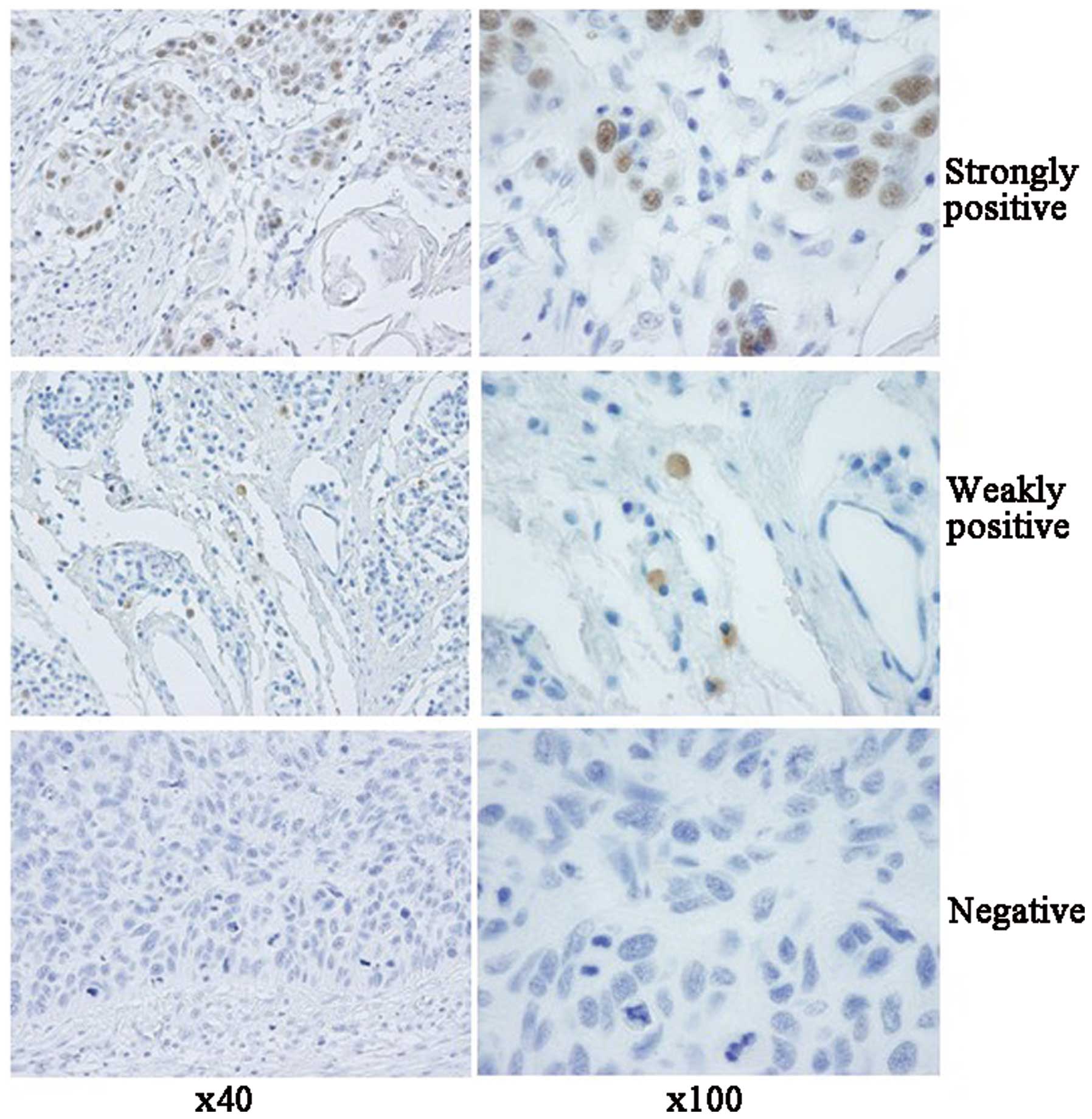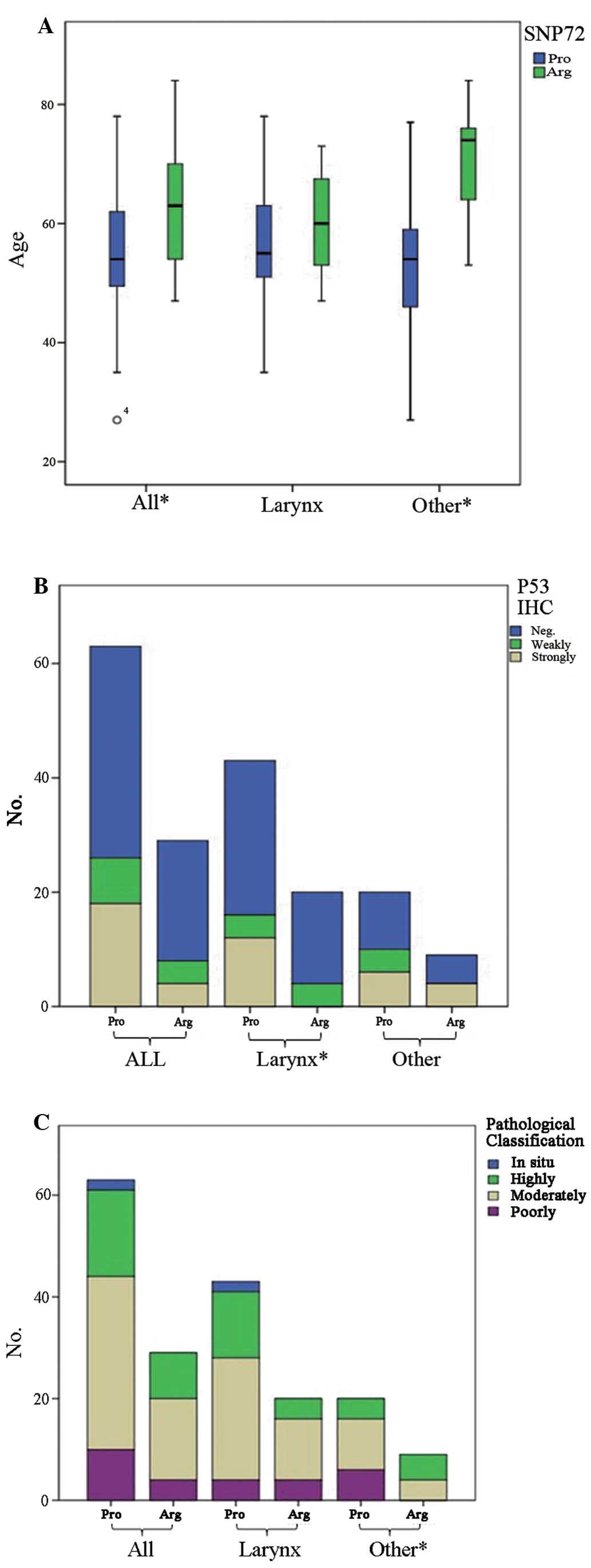|
1
|
Parkin DM, Bray F, Ferlay J and Pisani P:
Global cancer statistics, 2002. CA Cancer J Clin. 55:74–108. 2005.
View Article : Google Scholar
|
|
2
|
Gillison ML, Koch WM, Capone RB, et al:
Evidence for a causal association between human papillomavirus and
a subset of head and neck cancers. J Natl Cancer Inst. 92:709–720.
2000. View Article : Google Scholar : PubMed/NCBI
|
|
3
|
Sturgis EM and Cinciripini PM: Trends in
head and neck cancer incidence in relation to smoking prevalence:
an emerging epidemic of human papillomavirus-associated cancers?
Cancer. 110:1429–1435. 2007. View Article : Google Scholar : PubMed/NCBI
|
|
4
|
Wang Z, Sturgis EM, Zhang Y, et al:
Combined p53-related genetic variants together with HPV
infection increase oral cancer risk. Int J Cancer. 131:E251–E258.
2012.PubMed/NCBI
|
|
5
|
Rautava J and Syrjänen S: Biology of human
papillomavirus infections in head and neck carcinogenesis. Head
Neck Pathol. 6(Suppl 1): S3–S15. 2012. View Article : Google Scholar : PubMed/NCBI
|
|
6
|
Braakhuis BJ, Snijders PJ, Keune WJ, et
al: Genetic patterns in head and neck cancers that contain or lack
transcriptionally active human papillomavirus. J Natl Cancer Inst.
96:998–1006. 2004. View Article : Google Scholar : PubMed/NCBI
|
|
7
|
Smeets SJ, Braakhuis BJ, Abbas S, et al:
Genome-wide DNA copy number alterations in head and neck squamous
cell carcinomas with or without oncogene-expressing human
papillomavirus. Oncogene. 25:2558–2564. 2006. View Article : Google Scholar : PubMed/NCBI
|
|
8
|
Whibley C, Pharoah PD and Hollstein M: p53
polymorphisms: cancer implications. Nat Rev Cancer. 9:95–107. 2009.
View Article : Google Scholar : PubMed/NCBI
|
|
9
|
Dumont P, Leu JI, Della Pietra AC III,
George DL and Murphy M: The codon 72 polymorphic variants of p53
have markedly different apoptotic potential. Nat Genet. 33:357–365.
2003. View
Article : Google Scholar : PubMed/NCBI
|
|
10
|
Buyru N, Altinisik J, Isin M and Dalay N:
p53 codon 72 polymorphism and HPV status in lung cancer. Med Sci
Monit. 14:CR493–CR497. 2008.PubMed/NCBI
|
|
11
|
Storey A, Thomas M, Kalita A, et al: Role
of a p53 polymorphism in the development of human
papillomavirus-associated cancer. Nature. 393:229–234. 1998.
View Article : Google Scholar : PubMed/NCBI
|
|
12
|
Wei W, Shi Q, Guo F, et al: The
distribution of human papillomavirus in tissues from patients with
head and neck squamous cell carcinoma. Oncol Rep. 28:1750–1756.
2012.PubMed/NCBI
|
|
13
|
Kato S, Han SY, Liu W, et al:
Understanding the function-structure and function-mutation
relationships of p53 tumor suppressor protein by high-resolution
missense mutation analysis. Proc Natl Acad Sci USA. 100:8424–8429.
2003. View Article : Google Scholar
|
|
14
|
SIFT Journal. http://sift.bii.a-star.edu.sg.
|
|
15
|
Tornesello ML, Buonaguro L and Buonaguro
FM: Mutations of the TP53 gene in adenocarcinoma and
squamous cell carcinoma of the cervix: a systematic review. Gynecol
Oncol. 128:442–448. 2013.
|
|
16
|
Hollstein M, Moriya M, Grollman AP and
Olivier M: Analysis of TP53 mutation spectra reveals the
fingerprint of the potent environmental carcinogen, aristolochic
acid. Mutat Res. Feb 17–2013.(Epub ahead of print). View Article : Google Scholar
|
|
17
|
Kannan K, Munirajan AK, Krishnamurthy J,
et al: Low incidence of p53 mutations in betel quid and
tobacco chewing-associated oral squamous carcinoma from India. Int
J Oncol. 15:1133–1136. 1999.
|
|
18
|
Heinzel PA, Balaram P and Bernard HU:
Mutations and polymorphisms in the p53, p21 and p16
genes in oral carcinomas of Indian betel quid chewers. Int J
Cancer. 68:420–423. 1996.PubMed/NCBI
|
|
19
|
Saranath D, Tandle AT, Teni TR, et al: p53
inactivation in chewing tobacco-induced oral cancers and
leukoplakias from India. Oral Oncol. 35:242–250. 1999. View Article : Google Scholar : PubMed/NCBI
|
|
20
|
Lukas J, Bohr VA and Halazonetis TD:
Cellular responses to DNA damage: current state of the field and
review of the 52nd Benzon Symposium. DNA Repair. 5:591–601. 2006.
View Article : Google Scholar : PubMed/NCBI
|
|
21
|
Kilpivaara O and Aaltonen LA: Diagnostic
cancer genome sequencing and the contribution of germline variants.
Science. 339:1559–1562. 2013. View Article : Google Scholar : PubMed/NCBI
|
|
22
|
Bosch FX, Ritter D, Enders C, et al: Head
and neck tumor sites differ in prevalence and spectrum of
p53 alterations but these have limited prognostic value. Int
J Cancer. 111:530–538. 2004. View Article : Google Scholar : PubMed/NCBI
|
|
23
|
Zhou W, Ma Y, Yang H, Ding Y and Luo X: A
label-free biosensor based on silver nanoparticles array for
clinical detection of serum p53 in head and neck squamous cell
carcinoma. Int J Nanomedicine. 6:381–386. 2011. View Article : Google Scholar : PubMed/NCBI
|
|
24
|
Peltonen JK, Helppi HM, Pääkkö P,
Turpeenniemi-Hujanen T and Vähäkangas KH: p53 in head and neck
cancer: functional consequences and environmental implications of
TP53 mutations. Head Neck Oncol. 2:362010. View Article : Google Scholar : PubMed/NCBI
|
|
25
|
Betiol J, Villa LL and Sichero L: Impact
of HPV infection on the development of head and neck cancer. Braz J
Med Biol Res. 46:217–226. 2013. View Article : Google Scholar : PubMed/NCBI
|
|
26
|
Tribius S and Hoffmann M: Human papilloma
virus infection in head and neck cancer. Dtsch Arztebl Int.
110:184–190. 2013.PubMed/NCBI
|
|
27
|
Walter SD, Riddell CA, Rabachini T, Villa
LL and Franco EL: Accuracy of p53 codon 72 polymorphism
status determined by multiple laboratory methods: a latent class
model analysis. PLoS One. 8:e564302013.
|
|
28
|
Chen SP, Hsu NY, Wu JY, et al: Association
of p53 codon 72 genotypes and clinical outcome in human
papillomavirus-infected lung cancer patients. Ann Thorac Surg.
95:1196–1203. 2013. View Article : Google Scholar : PubMed/NCBI
|
|
29
|
Zhou X, Gu Y and Zhang SL: Association
between p53 codon 72 polymorphism and cervical cancer risk among
Asians: a HuGE review and meta-analysis. Asian Pac J Cancer Prev.
13:4909–4914. 2012. View Article : Google Scholar : PubMed/NCBI
|
|
30
|
Kaghad M, Bonnet H, Yang A, et al:
Monoallelically expressed gene related to p53 at 1p36, a region
frequently deleted in neuroblastoma and other human cancers. Cell.
90:809–819. 1997. View Article : Google Scholar : PubMed/NCBI
|
|
31
|
Thomas M, Kalita A, Labrecque S, Pim D,
Banks L and Matlashewski G: Two polymorphic variants of wild-type
p53 differ biochemically and biologically. Mol Cell Biol.
19:1092–1100. 1999.PubMed/NCBI
|
|
32
|
Li F, Sturgis EM, Chen X, Zafereo ME, Wei
Q and Li G: Association of p53 codon 72 polymorphism with
risk of second primary malignancy in patients with squamous cell
carcinoma of the head and neck. Cancer. 116:2350–2359.
2010.PubMed/NCBI
|
















